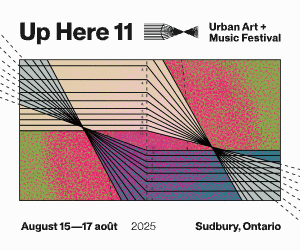Status/Non-Status Is Reconciling History One Track at a Time
Adam Sturgeon looks to the past to make sense of the future.
By Christine Leonard
- Published on
With a renewed focus on unearthing his ancestral birth rights, Sturgeon wisely utilized his downtime in 2020 by working from behind the mixing board with intention. Rewriting history one track at a time as Status/Non-Status, Sturgeon has developed an emerging Indigenous music project that honours his family’s background and the stories that bind them to their Anishinaabe community.
“As a person who is Indigenous, what has happened is that my story and my vision for the project is really at the forefront,” says Sturgeon. “Moving forward with identity and identity politics it’s really good to raise the bar of awareness. ‘Status’ being an issue that has affected my family and that sense of belonging within our community, pretty much our entire lives. Also acknowledging the privileges I’ve had as a mixed person and, maybe more importantly, the way ‘Status’ has impacted our communities as a whole. It’s unfortunate that art has to be the vehicle for that representation rather than the actual policies and initiatives. But this is a way of raising the bar of awareness for the artist community.”
For Sturgeon the move to change the band’s name from Whoop-Szo to Status/Non-Status was a powerful act of acknowledgement towards his ongoing efforts to reconcile his family’s experiences as a ‘non-status’ Indigenous persons, as defined by the Canadian government. This is because his grandfather—whose tale is immortalized in Whoop-Szo’s Polaris Prize-nominated 2019 album, Warrior Down—enfranchised himself by joining the Armed Forces. Enfranchisement was the legal assimilation process by which the government revoked an Indigenous military enlistee’s Status Cards, terminating their Indian Status and rendering them a “Canadian citizen.”
“I’m an artist who’s also Indigenous. Rather than – I’m an indigenous artist. Maybe? But again, that responsibility I share is palpable so maybe we do want to wear it on our sleeves. But as far as music is concerned, I feel like I’m a songwriter and sometimes it’s going to be crazy and wild and sometimes it’s going to be simple and basic.”
For Status/Non-Status, the forthcoming 1, 2, 3, 4, 500 Years EP is an opportunity to connect audiences to a unique spiritual journey as captured during a transformative two-week tour and recording session retreat in Jalisco, Mexico in 2018. Recorded by Jesus Canibales at Rockweiler Studio in Guadalajara, the five sprawling neo-folk tracks then underwent production and editing by Kyl Ashbourne and Sturgeon with finishing touches by mix master Jesse Gander at Rain City Recorders in Vancouver, BC.


“Interestingly, before we were a touring band, we were a recording project, so when we went to Mexico it was an opportunity to do both. It seems so far in the distance now. Producing it was a chance to reflect on going into that amazing experience,” says Sturgeon. “We’ve always understood that you need to know where you are, who was here before you, who is here now, and who is helping build the communities. So, we got connected in a really nice way there. It’s really rooted in a grassroots community and dealing with the issues that are facing the community today and their history pre-colonial and otherwise.”
Drawing on these intercultural connections and an abiding sense of place for inspiration, Sturgeon’s Status/Non-Status has morphed into a phenomenon that reaches far beyond his reverberating garage in London, Ontario. What began as an intrepid musical foray has flourished into a pay-it-forward initiative that promises abundant dividends in the future.
“For my part, the songs that we brought to that project were very personal songs for me, so it makes for a bit of serendipity that the more I do this work the more I realize why community is so important. Ever since that time in Mexico, we’ve set up a brick-and-mortar space for the youth program we operate here. We’ve also been working to bring internship opportunities and other services to our community. It’s really about focusing on home and what that means. I think that comes from the idea that we’re best suited to tell our own stories.
By Leslie Ken Chu
The rock stalwarts lean into vulnerability and nuance, proving that evolution doesn’t have to mean softening the blow.
By Cam Delisle
The pop veteran beamed into Rogers Arena Tuesday night with a glitchy arsenal of remixed hits—some faring better than others in her AI-styled end-of-the-world fantasia.













